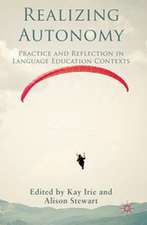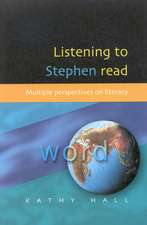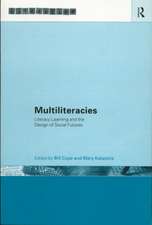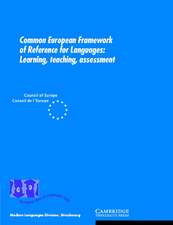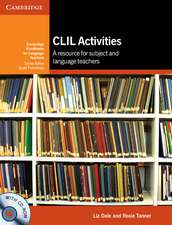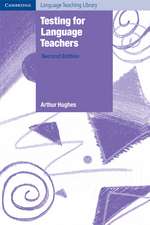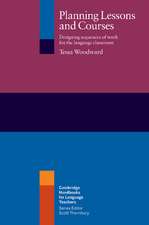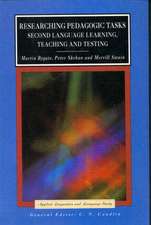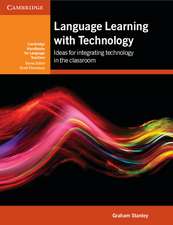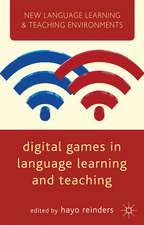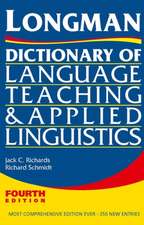Social Spaces for Language Learning: Stories from the L-café
Autor Garold Murray Editat de N. Fujishimaen Limba Engleză Hardback – 9 dec 2015
Addressing practical as well as theoretical concerns, this book provides advice for language professionals developing and managing social language learning spaces, pedagogical insights for teachers exploring their role in out-of-class learning, and direction for researchers examining the various facets of language learning beyond the classroom.
Preț: 418.83 lei
Nou
Puncte Express: 628
Preț estimativ în valută:
80.14€ • 83.89$ • 66.70£
80.14€ • 83.89$ • 66.70£
Carte tipărită la comandă
Livrare economică 31 martie-14 aprilie
Preluare comenzi: 021 569.72.76
Specificații
ISBN-13: 9781137530097
ISBN-10: 113753009X
Pagini: 152
Ilustrații: X, 154 p.
Dimensiuni: 140 x 216 x 13 mm
Greutate: 0.36 kg
Ediția:1st ed. 2016
Editura: Palgrave Macmillan UK
Colecția Palgrave Pivot
Locul publicării:London, United Kingdom
ISBN-10: 113753009X
Pagini: 152
Ilustrații: X, 154 p.
Dimensiuni: 140 x 216 x 13 mm
Greutate: 0.36 kg
Ediția:1st ed. 2016
Editura: Palgrave Macmillan UK
Colecția Palgrave Pivot
Locul publicării:London, United Kingdom
Cuprins
Introduction
1. Exploring a Social Space for Language Learning; Garold Murray and Naomi Fujishima
PART I: ADMINISTRATORS' PERSPECTIVES
2. Creating the L-café: An Administrator's Standpoint; Makoto Tahara
3. Five Years at the L-café: The Secret of Its Success; Mariko Uzuka
4. Management of L-café; Masumi Fujimoto
PART II: TEACHERS' PERSPECTIVES
5. What I Learned From Working at the L-Café; Bob Lamitie
6. Writing Tutorials at the L-café; Masumi Igarashi
7. Providing Study Abroad Advice as a Viable Use of Social Learning Spaces; Thomas Fast
8. Optimizing Affordances: Developing a 'Digital Habitat' for the L-café; Claire Uchida
PART III: STUDENTS' PERSPECTIVES
9. The Door to the L-café, the Door to the World; Naoko Nakamoto
10. My Life in the L-café from Different Angles; Kanako Miyake
11. L-café: The International Home; Kelly Ho
12. Defining Experience through the L-café; Daniel Tangonan
13. The Dark Side of L-café; Yosuke Hino
14. MyCritical Thoughts on English-Café and the L-Café; Saburo Fukuba
15. How I Got Involved with the L-café; Yu Miura
16. Fulfilling Time at the L-café; Yuya Tanimoto
17. L-café: The Source of My Motivation to Study English; Kazunori Kuwada
18. Understanding Social Spaces for Language Learning; Garold Murray and Naomi Fujishima
1. Exploring a Social Space for Language Learning; Garold Murray and Naomi Fujishima
PART I: ADMINISTRATORS' PERSPECTIVES
2. Creating the L-café: An Administrator's Standpoint; Makoto Tahara
3. Five Years at the L-café: The Secret of Its Success; Mariko Uzuka
4. Management of L-café; Masumi Fujimoto
PART II: TEACHERS' PERSPECTIVES
5. What I Learned From Working at the L-Café; Bob Lamitie
6. Writing Tutorials at the L-café; Masumi Igarashi
7. Providing Study Abroad Advice as a Viable Use of Social Learning Spaces; Thomas Fast
8. Optimizing Affordances: Developing a 'Digital Habitat' for the L-café; Claire Uchida
PART III: STUDENTS' PERSPECTIVES
9. The Door to the L-café, the Door to the World; Naoko Nakamoto
10. My Life in the L-café from Different Angles; Kanako Miyake
11. L-café: The International Home; Kelly Ho
12. Defining Experience through the L-café; Daniel Tangonan
13. The Dark Side of L-café; Yosuke Hino
14. MyCritical Thoughts on English-Café and the L-Café; Saburo Fukuba
15. How I Got Involved with the L-café; Yu Miura
16. Fulfilling Time at the L-café; Yuya Tanimoto
17. L-café: The Source of My Motivation to Study English; Kazunori Kuwada
18. Understanding Social Spaces for Language Learning; Garold Murray and Naomi Fujishima
Recenzii
“Social spaces for language learning: Stories from the L-café describes the background, evolution and impact of the L-café, a social language learning space (SLLS) at Okayama University, Japan. This book is a must-read for anyone considering creating a similar space. … The narrative style of the text lends to an enjoyable and highly comprehensible reading experience … will be of value to researchers and practitioners alike.” (Anthony DiGiulio, Independence, Issue 71, October–November, 2017)
Notă biografică
Garold Murray is an associate professor in the Language Education Center at Okayama University, Japan. He has published widely on the subject of autonomy in language learning and is currently pursuing research interests in social learning spaces, the semiotics of place, and imagination in language learning.
Naomi Fujishima is a professor in the Language Education Center at Okayama University, Japan. Her interest in learner autonomy and student motivation stems from her years of teaching in Japan and the US. She has been actively involved in the Japan Association for Language Teaching for the past 25 years.
Naomi Fujishima is a professor in the Language Education Center at Okayama University, Japan. Her interest in learner autonomy and student motivation stems from her years of teaching in Japan and the US. She has been actively involved in the Japan Association for Language Teaching for the past 25 years.
Textul de pe ultima copertă
Social spaces for language learning, places where learners can come together in order to learn with and from each other, have an important role to play in foreign language acquisition and L2 identity development. In this book, sixteen students, teachers and administrators tell how they experience the L-café, a social language learning space located on the campus of a Japanese university. As part of a narrative inquiry, their unabridged stories are framed by background information on the study and an in-depth analysis informed by theories of space and place, and complex dynamic systems.
Addressing practical as well as theoretical concerns, this book provides advice for language professionals developing and managing social language learning spaces, pedagogical insights for teachers exploring their role in out-of-class learning, and direction for researchers examining the various facets of language learning beyond the classroom.
Addressing practical as well as theoretical concerns, this book provides advice for language professionals developing and managing social language learning spaces, pedagogical insights for teachers exploring their role in out-of-class learning, and direction for researchers examining the various facets of language learning beyond the classroom.


